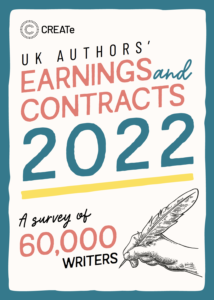 CREATe has released a study of UK Authors’ Earnings and Contracts based on a large-scale survey of 60,000 authors conducted in 2022. The survey was funded as independent research by the UK Authors’ Licensing and Collecting Society (ALCS), and is the latest in a series of longitudinal, comparative surveys since 2006 (as repeated in 2014 and 2018).
CREATe has released a study of UK Authors’ Earnings and Contracts based on a large-scale survey of 60,000 authors conducted in 2022. The survey was funded as independent research by the UK Authors’ Licensing and Collecting Society (ALCS), and is the latest in a series of longitudinal, comparative surveys since 2006 (as repeated in 2014 and 2018).
The latest report (researched by Amy Thomas, Michele Battisti and Martin Kretschmer) raises serious questions about the sustainability of the writing profession in the UK. Whilst many of the authors surveyed talked about their love of creating and passion for writing, relying on intrinsic motivation has been used to justify an increasingly unliveable wage as incomes consistently decline. This appears to form part of a wider trend of de-valuing creative labour both in the UK and across the globe.
The report also finds that writing is far from an equal opportunity profession. There are substantial inequalities between those who are being adequately rewarded for their writing, and those who are not. Women, people of colour, the very young, and the very old, are all consistently earning less than their respective counterparts. This raises important questions about whether we are stifling our creative culture by disincentivising a broad and diverse group of writers from participating in this market.
The timing of the report is unique in examining the immediate effects of the Covid-19 pandemic and Brexit on the writing profession. And indeed, we found meaningful changes as to how writers are accessing both digital and foreign markets in response to these disruptive changes. Whilst both changes offer opportunities, they also introduce risks to a distinctly vulnerable profession.
Download the report here. An accessible version of the report is available here (without visualisations).
The AHRC Creative Industries Policy and Evidence Centre (PEC) have match funded a policy brief that will respond to the findings from the survey in early 2023. Media coverage of the report is tracked on the project page. Subscribe to our newsletter to find out more in the coming months.
Executive summary
ALCS (the UK Authors’ Licensing and Collecting Society) commissioned CREATe (the UK Copyright & Creative Economy Research Centre based at the University of Glasgow) to conduct independent research into authors’ earnings in the UK. The survey builds on previous, longitudinal and comparative research enabling us to track trends in earnings and working conditions over 16 years. We issued the survey to members of the ALCS on 1 February 2022, asking for information for the tax years 2019/20 (pre-Covid) and 2020/21 (Covid affected).
This report is situated amidst an arguably global trend towards the de-valuing of creative labour. The survey also took place in the aftermath of two hugely disruptive events for UK authors: the Covid-19 pandemic (the first UK lockdown started on 23 March 2020), and Brexit (the transition period ended on 1 January 2021). We find that, despite being sometimes heralded as great equalisers, these events had significant and disproportionate effects on certain groups of authors. While some of their effects may have not fully materialised, neither Covid-19 nor Brexit appear to have fundamentally changed the creative labour markets; rather, they have accelerated existing trends.
In line with previous surveys, we focus on the group of primary occupation authors for comparison over time. Primary occupation authors are those who allocate at least 50% of their working time to writing. We chart a decline in median (typical) earnings from self-employed writing among primary occupation authors of 38.2% (in real terms) since the last survey in 2018 (i.e., from £11,329 to £7,000). Even more dramatically, we see a sustained downward trend over the past two decades that seems to be associated with changes to creative labour markets in the digital environment.
| Primary occupation authors | 2006 | 2014 | 2018 | 2022 |
| Median earnings from self-employed writing (as reported in respective surveys) | £12,330 | £11,000 | £10,497 | £7,000 |
| Median earnings from self-employed writing – real terms (i.e. controlling for inflation) | £17,608 | £12,455 | £11,329 | £7,000 |
Following this decline in earnings, there are serious questions over the future of writing as a profession. Authors always had to rely on a portfolio of earnings to make a living, but this dependency is increasing.
We find that, consistent with previous reports, the number of authors who report that writing is their primary occupation stagnates at around 50% of the total writing population. However, we chart a noticeable decline in the number of authors who earn all of their income from writing, decreasing from 40% of the total sample of primary occupation authors in 2006, to 28% in 2018, and now 19% as of 2022.
As with many cultural markets, the profession of writing is characterised by winner-takes-all dynamics and extremely high levels of earnings inequality. We find that the top 10% of authors earn about 47% of the total income of the population. Many authors appear to rely on other members of their household who typically earn well (with a median household income of £50,000 per annum across all respondents). In compiling a detailed demographic profile of the authors surveyed, we find that certain characteristics make it harder for an author to earn a living. Women, black and mixed-race authors, the very young, and very old, all earn less than their respective counterparts. They also are less likely to have access to a household subsidy. This has implications for the diversity of creative production.
Contracts appear to be changing the authors’ earnings landscape with implications for long-term earning potential. Advances are becoming rarer, with almost half of all authors never having received any such payment. Buy-out contracts, by contrast, are becoming increasingly common, increasing in frequency from 25% in the 2018 survey to 32% in 2021.
Copyright continues to be little understood and under-utilised by authors. Whilst over half of the authors we surveyed feel moderately confident in their knowledge of copyright, we find evidence of misconceptions which potentially curtail an author’s earning potential through the realisation of their rights. Authors report that the increasing use of boilerplate publishing contracts is creating a culture of apathy in respect of moral rights; authors must either agree to waive their right to be acknowledged for their work, or leave potentially lucrative publishing deals.
In a detailed qualitative analysis of the effects of Covid-19 on authors’ earnings and working lives, we find that the pandemic had a negative effect on the majority of authors. Whilst some changes in lifestyle suggest moderate improvements to an author’s financial situation (e.g., saving on commuting costs), substantial improvements appear reserved to recipients of large, one-off grants and advances. We also find a distinct gendered element to experiences of Covid, with men more frequently reporting a positive or neutral experience of the pandemic than women. This may be explained by the existence of another form of household subsidy in the form of emotive and physical household labour, with women’s career routes and sources of incomes more readily destabilised by changing working conditions.
We also conducted investigations into a group of authors who are very exposed to digital trends, authors in the audio-visual sector. Despite a booming industry, the value of audio-visual streaming does not seem to be filtering through to authors. We chart the conditions of audio-visual authors to give explanatory value to this, documenting the changing contractual landscape for authors, and the bottleneck of payments in the industry.


